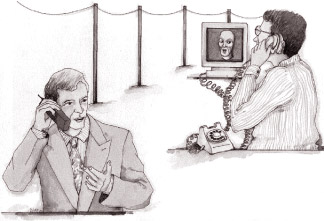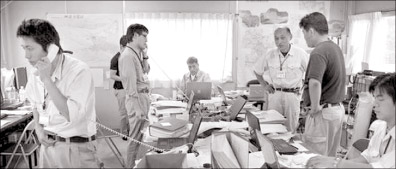|
Tips and protocol on telephone interviews:
Demand for proper etiquette when on the line
Gaston de ROSAYRO
In one of our earlier discussions on the basics of interviewing we
looked at why interviews are important to journalists, how to plan and
prepare for them and how to conduct them. Today we focus on telephone
interviews and their advantages, but with also an eye on traps to be
wary of.
Used properly, the telephone can be a journalist’s best friend. It
can save you valuable time and is especially a priceless means of
communication when talking to people who are too far away for you to
visit, or when trying to beat a perilous deadline. Always remember there
are basic rules and etiquette when using a telephone.
|

An interview with an official |
Try to use the same bright, friendly manner, which you use for
face-to-face interviews, for the telephone as well. You will inspire
confidence in the person you are calling, and get your story much more
quickly.
Do not be too hard on secretaries who are protecting the important
people you are trying to contact. They are only doing their job. If they
have been told by their boss to protect him from you, then you will not
get anywhere by being angry. In that situation, the telephone is
unlikely to succeed and you will have no alternative but to visit in
person.
|

Answering phone calls at the newsroom |
Always remember that even the most formidable ‘Dragon Ladies’
guarding their bosses’ domains could sometimes be persuaded to yield to
charm and good manners. There have been times in my early career when I
had managed to wrangle a big-wig’s private number from a protective
secretary by laying on a bit of charisma. It works most of the time. And
if that ploy fails, you could always resort to a bit of ‘harmless
blackmail’. I mean you could hint subtly and ever so politely that the
need to contact the top honcho would be in his and the company’s best
interests.
Remember that when you telephone someone at home, at night or during
the weekend, you are intruding into their private family life. You
should not do so unless the story demands it.
Even if it does, you should apologise for having to interrupt them
and state your business quickly. Because a journalist uses the phone so
often, it is important that you should know the standard rules of
telephone politeness for the profession.
|

Being friendly over
the phone |
The people you phone for news are often busy persons holding
responsible and important positions. As such, they protect themselves
from trivia by employing secretaries to answer the phone for them, and
to separate the unimportant or minor calls from those which require
their personal attention.
For instance if you phone the Inspector General of Police, (IGP), you
will probably first be connected to the switchboard at Police
Headquarters. You will ask for the IGP’s office. There, his personal
assistant or secretary will answer the phone. You must give them your
name, the name of the organisation you work for and the nature of your
inquiry.
For example, you may say: "This is Gaston de Rosayro from the Daily
Echo, of the Crying Courier. May I speak to the IGP about the rounding
up of two alleged criminal gangs, please?"
|

A journalist taking down
notes over the phone |
He or she will ask you to hold on, while she speaks to the IGP to
tell him that you are on the line, who you are and what you want. He
will then decide whether to take the call, or to refer it to somebody
else - his deputy, or the public relations department, for example.
If he agrees to talk to you, you will hear him come on the line. You
must then repeat your name, your organisation and what you want. Do so
quickly and efficiently. Do not waste time mumbling and thinking about
exactly what it is you want to say. If you sound confused and unsure of
what you want, you will probably get nothing. You will also give your
newspaper or radio or TV station a bad reputation.
The conversation should go something like this: IGP: Yes?
You: Good afternoon, Mr Ilangakoon. This is Gaston de Rosayro from
the Daily Echo. I thought I might ask you about your department’s recent
arrests of the country’s most dangerous underworld gangs and what
follow-up procedures are being undertaken? I was wondering whether there
would be more arrests based on the statements made by the suspects?”
IGP: Certainly ... etc.
It is important to tell people who you phone, as soon as they come on
the line, that you are a journalist and who you work for, so the person
knows that what he says may later appear in print or on a radio or TV
bulletin. In everyday journalism it is unethical to try to get news by
pretending you are not a journalist, or even by not telling people that
you are a journalist at all.
Also always be polite when answering the phone even if you are in a
bad mood after a slanging match with your news editor. When the phone
rings in the newsroom and you pick it up, you should say "Newsroom,
Daily Echo" and then give your name - for example: "Daily Echo Newsroom,
Gaston de Rosayro speaking." It is not enough to say "Hello?", as this
forces the other person to waste time by asking if they are connected to
the newsroom and who they are speaking to.
If the caller wants to speak to a reporter who is not in the
newsroom, then you should say: "He is not in the office at the moment. I
will just find out where he is." Ask the news editor, or whoever else is
around, where the person is. If he will be back in a minute or two, you
may suggest that the caller waits. But if he is out for a while, you
must tell the caller so. You should then say: "Can I help you? Or can I
take a message?"
The caller can now choose. If they think you can help, they can talk
to you instead of the person they wanted. If they think you cannot help,
at least they can leave a message with you. The message should contain:
The caller's name and telephone number. The date and time they called.
What they wanted. Whether they will call back later, or whether they
want to be called back. Your own name.
It should be clearly written and left where the person will find it.
The most usual place for messages to be left for reporters is on their
keyboard. If you have an internal office email system, you can send them
an email with the information. It may all sound routine but telephone
etiquette is an important part of journalistic communication. Rudeness,
irritability and an off-handed manner never pays. It will not only leave
you without a story but will reflect badly on your organisation and the
entire fraternity as well.
Even if the recipient of your call is rude it is best to keep your
cool. Try to placate him if he is bad-tempered and on the defensive.
Apologise if you have called at an inconvenient time, but explain your
position that you are desperately trying to beat a deadline.
Remember this is journalistic protocol at its best. Proper telephone
etiquette should be an essential feature of any journalist’s armoury.
Allow that fact to keep ringing in your mind. It may sound basically
trivial but it pays far richer dividends than most would imagine.
[email protected]
|



